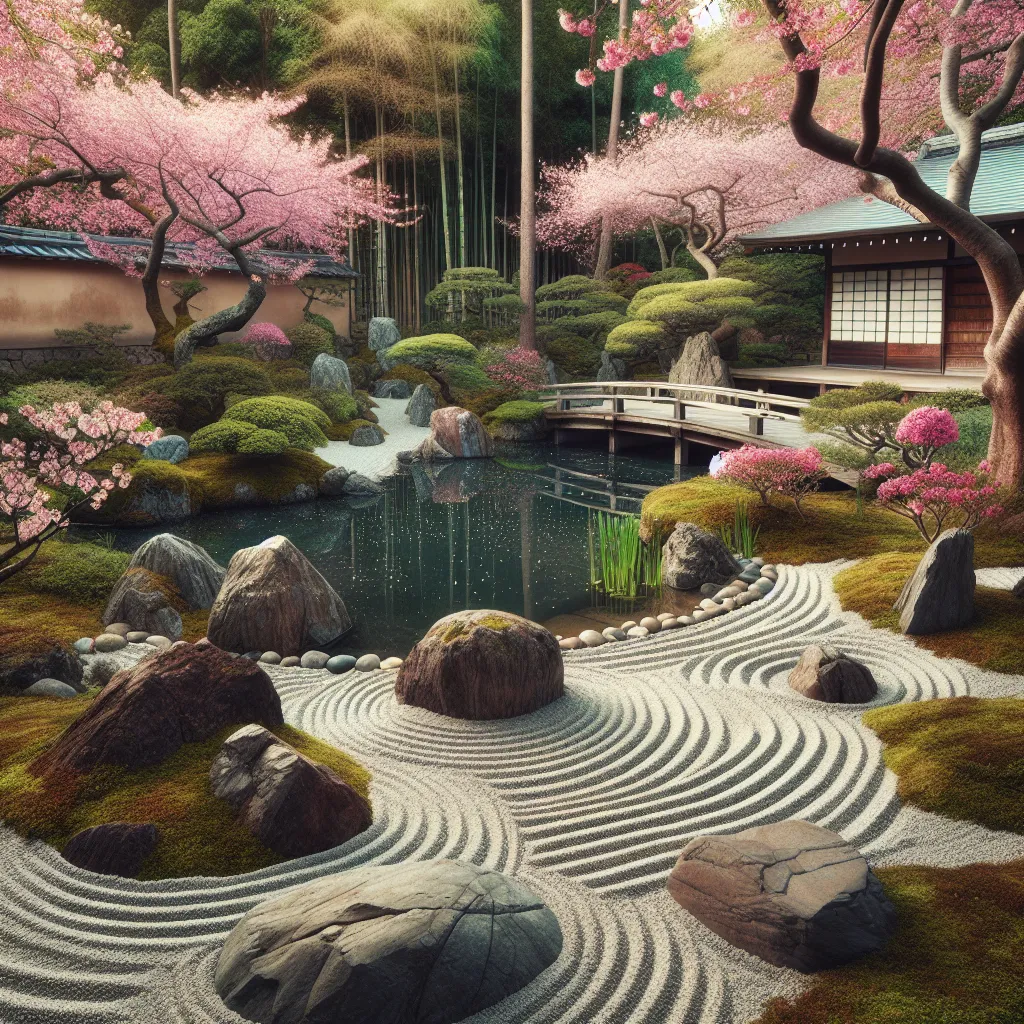
- Published on
- Authors

- Name
- You
Zen Gardens: Creating Spaces of Contemplation and Harmony
Introduction
Zen gardens, or Karesansui, are traditional Japanese gardens that emphasize the principles of simplicity, mindfulness, and harmony. These serene landscapes offer spaces for contemplation and have captivated the interest of individuals seeking tranquility and balance in their busy lives. By integrating advanced landscaping science and mystical wisdom, Karesansui gardens become more than mere decorations; they evolve into sanctuaries of meditation and inner peace.
Principles of Zen Gardens
Simplicity and Minimalism
Zen gardens are rooted in the Zen Buddhist philosophy of simplicity and minimalism. Every element in the garden is intentionally placed to represent natural landscapes using minimal materials. This stark simplicity allows for a clear, undistracted mind, fostering a meditative state.
Harmony with Nature
Embedded deeply within the tradition is the concept of nature's beauty. Rocks, sand, moss, and strategically placed plants create a harmonious representation of natural elements such as mountains, rivers, and islands. The goal is to imitate the essence of a natural landscape, invoking the same calming effect.
Asymmetry and Balance
Unlike Western gardens that favor symmetry, Zen gardens embrace asymmetry. This principle reflects the natural world's imperfections, reminding observers of the beauty found in irregularity and balance.
Symbolic Elements of Karesansui
| Element | Symbolism | Purpose |
|---|---|---|
| Rocks | Mountains, islands, or animals | Create focal points and encourage contemplation |
| Sand/Gravel | Water, ocean, or clouds | Raked to represent waves, fostering a serene mind |
| Moss | Stability, resilience, and ancient times | Adds texture and symbolizes enduring strength |
| Bridges | Transition, journey between realms | Encourages meditation on life's path |
| Lanterns | Enlightenment, guidance | Illuminate paths, both physical and spiritual |
The Science Behind Zen Gardens
Modern science helps us understand why Zen gardens are so effective in promoting mental well-being. Research in environmental psychology reveals that natural settings and green spaces reduce stress, enhance mood, and improve cognitive function. The biophilia hypothesis suggests that humans have an innate affinity for nature, which Zen gardens tap into by mimicking natural landscapes.
Benefits of Zen Gardens
- Stress Reduction: The tranquil environment lowers cortisol levels, reducing stress.
- Enhanced Focus: The simplicity aids in eliminating distractions, improving concentration.
- Mental Clarity: Contemplation and meditation foster a peaceful state of mind.
Creating Your Own Zen Garden
Choosing the Right Space
Select a quiet, open space where the garden can be viewed and appreciated. Whether a small courtyard or a spacious yard, ensure the environment supports relaxation and contemplation.
Essential Materials
- Rocks and Stones: Choose stones of various sizes to represent mountains and islands.
- Sand or Gravel: Opt for light-colored sand to enhance the garden's aesthetics.
- Moss and Plants: Include resilient moss and minimal plants for texture and contrast.
- Rakes: Use rakes to create patterns in the sand, representing waves or flowing water.
Design and Layout
- Plan the Layout: Sketch a basic design, positioning rocks strategically to form visual interest points.
- Layer the Sand: Spread an even layer of sand across the designated area.
- Arrange the Rocks: Place rocks intentionally, keeping symbolism in mind.
- Rake Patterns: Carefully rake the sand to create tranquil patterns resembling water or clouds.
Conclusion
Zen gardens, with their rich blend of aesthetics, symbolism, and mindful design, offer more than just visual pleasure. They are spaces of profound calm, inviting contemplation and fostering an enduring connection with nature. By understanding and applying the principles of Karesansui, anyone can create a personal sanctuary for peace and introspection.
In a world increasingly disconnected from nature, Zen gardens serve as a bridge to the serene landscapes of our inner and outer worlds, reminding us that amidst chaos, there can always be a peaceful refuge.
We hope this guide inspires you to explore the art of Zen gardening and discover the tranquility it offers. Remember, the true beauty of a Zen garden lies not just in its appearance, but in the peace and harmony it brings to your soul.
